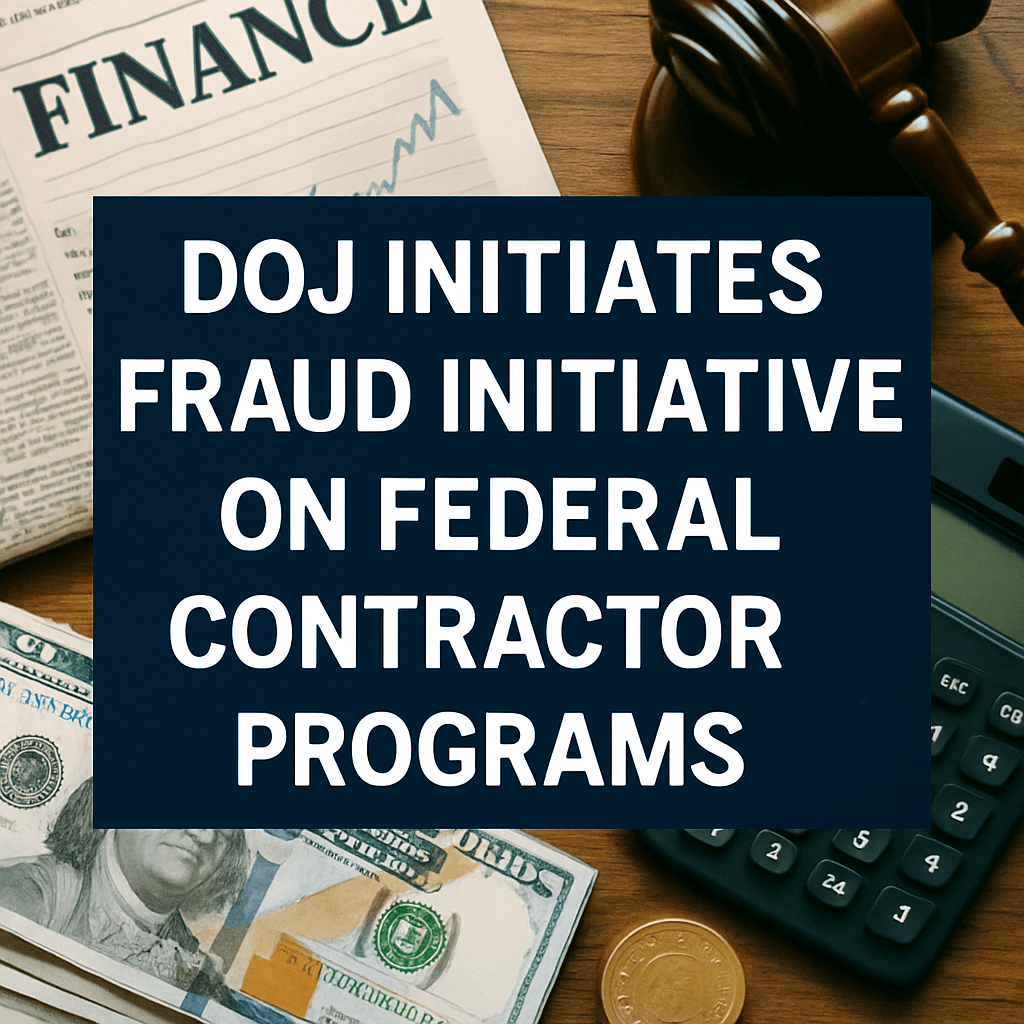DOJ Initiates Fraud Initiative on Federal Contractor Programs

Overview of the Civil Rights Fraud Initiative
On May 19, the U.S. Department of Justice (DOJ) announced the formation of the Civil Rights Fraud Initiative, a new enforcement program that leverages the False Claims Act (FCA) to investigate federal funding recipients for alleged civil rights violations. Co-led by the Civil Division’s Fraud Section and the Civil Rights Division, the Initiative will assemble dedicated teams of prosecutors to aggressively pursue cases against organizations—public or private—that knowingly use federal dollars to discriminate.
Key Objectives
- Identify systemic abuses of federal funds in diversity, equity and inclusion (DEI) programs.
- Use FCA litigation to recover losses and impose civil penalties.
- Encourage whistleblowers with firsthand knowledge of alleged violations to file qui tam actions under the FCA.
Mechanics of the False Claims Act
The FCA (31 U.S.C. §§ 3729–3733) historically targets billing and procurement fraud: a contractor overbilling the government, for instance, or a health care provider charging Medicare for nonexistent treatments. Under the Act:
- Liability attaches when a defendant “knowingly” submits false claims or causes others to do so. “Knowingly” includes actual knowledge, deliberate ignorance or reckless disregard.
- Plaintiffs need only meet a preponderance of the evidence standard, lower than the beyond a reasonable doubt bar in criminal prosecutions.
- Civil penalties range from $12,548 to $25,157 per false claim, plus treble damages—three times the government’s actual losses.
- Qui tam relators (whistleblowers) may receive up to 30% of any recovery, which totaled nearly $3 billion in the 2024 fiscal year across all FCA cases.
Expansion to DEI Programs
Deputy Attorney General Todd Blanche underscored the Initiative’s focus in a public statement:
“The days of using federal funds to further discrimination are over. We will investigate and, where appropriate, pursue claims against any recipient of federal funds that knowingly violates federal civil rights laws.”
Blanche specifically cited concerns over certain DEI policies in universities and federal contractors that, in his view, may disadvantage employees or applicants based on race, gender or belief. The DOJ’s May memorandum invites individuals with knowledge of potential discrimination to alert the department or file whistleblower suits.
Expert Analysis
Kate Driscoll, a partner at Morrison & Foerster and former Assistant U.S. Attorney, describes the Initiative as an “unprecedented extension” of the FCA. “The DOJ’s choice to classify certain DEI outcomes as ‘fraud’ signals a new enforcement priority,” she says. “Given the low evidentiary threshold, potential settlements can be significant.”
Comparing Historical Use of the False Claims Act
Enacted during the Civil War to combat Union Army supply fraud, the FCA has evolved into a cornerstone of white-collar enforcement. Major sectors include:
- Health care: Billing for unprovided treatments or inflated drug costs.
- Defense contracting: Overcharging for parts or delivering substandard materials.
- Education grants: Misreporting enrollment figures to receive higher federal aid.
The shift to civil rights-focused claims marks a strategic broadening, tapping into existing whistleblower frameworks to police alleged discrimination.
Implications for Corporate Compliance and Risk Management
Organizations receiving federal funds must now consider DEI audits and compliance measures akin to financial controls:
- Statistical sampling: Use regression analysis and disparate impact testing to assess hiring and promotion data.
- Policy reviews: Ensure DEI guidelines align with Title VI and Title VII of the Civil Rights Act and do not create unintended preferences.
- Whistleblower safeguards: Maintain clear reporting channels and confidentiality policies to manage internal complaints.
- Training programs: Educate HR, legal and executive teams on federal anti‐discrimination statutes and FCA implications.
Potential Legal Challenges and Litigation Risks
- Constitutional defenses: Organizations may argue Equal Protection or First Amendment grounds.
- Administrative law: Challenges under the Administrative Procedure Act if DOJ actions are deemed “arbitrary or capricious.”
- Qui tam volume: The incentive structure could spur a surge in private whistleblower suits, independent of government-initiated investigations.
Next Steps and Outlook
Companies with federal contracts should immediately conduct risk assessments of existing DEI initiatives and consult counsel on potential exposure under the FCA. As the Initiative ramps up, expect increased DOJ inquiries, settlement negotiations and a new compliance paradigm that treats civil rights safeguards as financial controls.